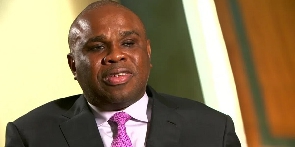 Professor Benedict Oramah bid farewell to the bank at the 32nd Annual Meetings in Abuja
Professor Benedict Oramah bid farewell to the bank at the 32nd Annual Meetings in Abuja
Professor Benedict Oramah, the President and Chairman of the Board of Directors of the African Export-Import Bank (Afreximbank), on Friday bid farewell to the bank at the 32nd Annual Meetings in Abuja, where he delivered his final address.
This marks the end of a transformative decade-long tenure that reshaped African development finance.
Speaking at the Transcorp Congress Hall where his journey with Afreximbank began in 1993, Professor Oramah reflected on unprecedented growth during his leadership since 2015.
The emotional address came full circle at the Hall, the venue where he first witnessed the signing of the Afreximbank Charter in October 1993, some 32 years ago.
Under his stewardship, the bank’s total assets and guarantees grew more than eight-fold, reaching US$43.5 billion by April 2025, while total revenues rose seven-fold to US$3.24 billion from US$408 million in 2015.
“I stand before you most pleased and fulfilled that I kept my promises,” Prof Oramah told the gathering of African Heads of State, government officials and other stakeholders, clearly stating that he gave the job the best of his energy, intellect, courage and determination.
The outgoing president highlighted the bank’s investment footprint, with approximately US$120bn invested in Africa and the Caribbean between 2020 and May 2025, and US$155bn during the entire decade.
Net income surged by 700 percent from US$125 million in 2015 to about US$1 billion in 2024, while shareholders’ funds increased from US$1 billion to US$7.5 billion over the same period.
During his tenure, Professor Oramah positioned Afreximbank as Africa’s crisis response institution, leading interventions during major economic shocks, including the disbursement of US$10 billion during the 2015-2016 commodity price crisis to Ghana, Nigeria, and Egypt.
Also, during the COVID-19 pandemic, it provided US$8 billion in support and facilitated the procurement of 400 million Johnson & Johnson vaccine doses through a US$2 billion facility for African countries.
The Ukraine crisis response saw Afreximbank disbursing US$50bn between 2022 and 2023, helping African economies diversify sourcing and develop internal capacities.
The bank fast-tracked petroleum refineries and fertilizer production projects to reduce dependence on Black Sea supplies, while expanding payment services to countries that lost international credit lines.
Professor Oramah said the bank’s leadership philosophy centered on what he termed; ‘African Best Practice,’ which made “each great nation shape its own destiny, rejecting externally defined international standards that had kept Africa stagnant for 60 years.”
This approach enabled landmark deals that traditional institutions avoided, including over US$4 billion in support for Nigeria’s Dangote Refinery and Petrochemical complex, now operational and cutting petroleum imports by US$10-12 billion annually.
The bank also arranged a $2.9 billion credit facility entirely from within Africa for Tanzania’s Rufiji dam and hydropower plant project.
Under his leadership, Afreximbank became the primary architect of African financial integration through initiatives like the Pan-African Payment and Settlement System (PAPSS), which has processed US$68 billion in trade payments across 16 countries.
The bank also championed the African Continental Free Trade Agreement implementation, raising intra-African trade finance from three per cent to 32 per cent of its total loan portfolio.
The institution expanded beyond traditional trade finance into industrial development, healthcare, and creative industries as partnerships saw investment in Special Industrial Zones across nine countries, including Africa’s first Medical Centre of Excellence.
A US$2 billion commitment supported the creative industries, while the recently established Concessional Finance Window aims to raise US$5bn for development assistance.
Professor Oramah acknowledged the foundation laid by his predecessors; Christopher Edordu, the pioneer president, and Jean-Louis Ekra, the second president , while expressing confidence in the bank’s future trajectory.
He lauded the Board of Directors’ rigorous selection process and urged continued strong support for the bank’s new leadership, emphasising that the institution’s success depended on unwavering shareholder commitment and protection.
He projected that his successor would lead the institution to US$250bn in total assets within the next decade, stating that the scale was necessary for Africa to “escape from the shame of poverty and underdevelopment.”
Shareholders are expected to vote on a new president later this week, with Abuja set to make history as the city where three of the bank’s four presidents would have been appointed.
